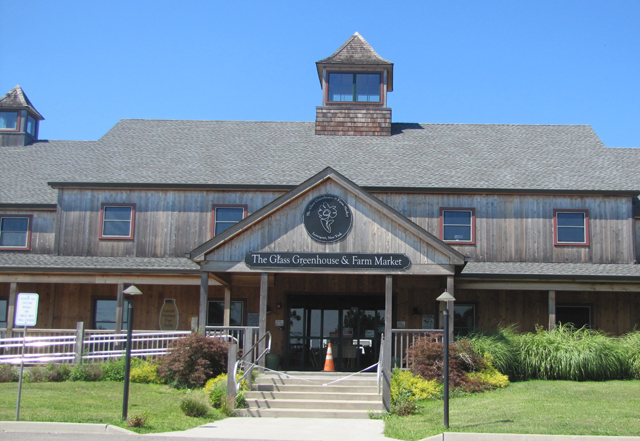Special permit for Glass Greenhouse stalled

Bistro or deli?
Defining the difference remains at the heart of Glass Greenhouse’s special permit application submitted to the Riverhead Town Board in May. The owners of the Jamesport business are seeking to create a 15-seat bistro inside the existing Farm Market building, but officials say details of the proposal remain unclear and it appears more like a deli.
“It’s not fair to another deli down the road or up the road that you’re going to do the same thing by special permit by disguising it as a bistro,” Councilman Tim Hubbard said. “I can’t go with that.”
Owner Walter Gabrielsen appeared before the Riverhead Town Board during last Thursday’s work session. Another special permit application was submitted to the town in May for the bistro, which was first proposed in 2016.
Mr. Gabrielsen said he would serve “light fare,” including produce, pies, and made-to-order soups, salads and sandwiches to stay or to go. No alcohol will be served and he did not initially plan on offering table service.
After a public hearing last month, the Town Board asked Mr. Gabrielsen and his attorney, Jaret Weber, to return with more information on the proposal, including how it meets the requirement for special permits under town code.
The 9.3-acre property on Route 25 is located in the Rural Corridor zoning district, which does allow bistros/cafes as a special permit use.
Under town code, a bistro is defined as “an eating establishment of 50 seats or less, whether indoor or outdoor, without drive-through or drive-in service.”
Though board members have raised concerns over the proposed take-out option, Mr. Weber noted that it’s not addressed in the code.
He also pointed out that neighboring Jamesport Vineyards was recently granted a special permit for an existing pizza bistro on its property.
“My general inquiry is, that for a vineyard that’s about 300 feet down the road, why there were no conditions with regard to take-out put in for a bistro special permit under the same zoning,” Mr. Weber said. “[It has] obviously become sort of an issue preventing approval at this stage for this application.”
Supervisor Laura Jens-Smith said the bistro at the vineyard complements the wine service.
“Some of the concern raised at this venue was not only past history of what has taken place there, but what is the mechanism that somebody would linger there for, other than the bistro, and how does that then not convert into a deli?” she asked the applicants.
Mr. Gabrielsen said the bistro would not become a central attraction but is something he’d like to offer as a “convenience” to his customers.
“We’re doing 15 seats versus 50 seats because quite frankly we can’t handle it,” he said, citing challenges in finding labor in other sectors of his business.
According to a Zoning Board of Appeals definition, a deli is defined as an “establishment which sells prepared, preserved and prepackaged food in a ready-to-consume state including, but not limited to, meats, prepared sandwiches, soups, salads and desserts for immediate consumption, primarily off premises,” and a seating area of no more than 16 seats.
“There tends to be a lot of crossover between what you’re saying and the definition of a deli,” Ms. Jens-Smith said, adding that she’d like to see a more detailed layout of the interior to get a clearer view of what exactly is being pitched.
Board members are approaching the issue “with caution,” according to Mr. Hubbard, due to pending litigation. In 2014, Riverhead Town claimed the business was “operating in a manner which exceeds the Town Code definition of a farm stand.”
Mr. Weber said that his client would be willing to offer table service and a written plan as a condition of special permit approval.
But the “elephant in the room,” according to Mr. Gabrielsen, is a certificate of occupancy. “[The CO] has not been issued for five years,” he said.
That could be resolved as part of a possible settlement, town attorney Robert Kozakiewicz said.
“We’ve never taken action to close the operation down,” he said, noting that the litigation raised questions over permitted uses of the property. “We took the position that you weren’t entitled [to a CO] because your operation was contrary to the zone.”
Ms. Jens-Smith said the current proposal was still too unclear.
“I think you have some homework to do to go back and flush out what it is you want to do,” she told Mr. Gabrielsen, asking them to return before the Town Board at a later date.
If granted a special permit, the owners would also need to gain site plan approval from the Planning Board.









